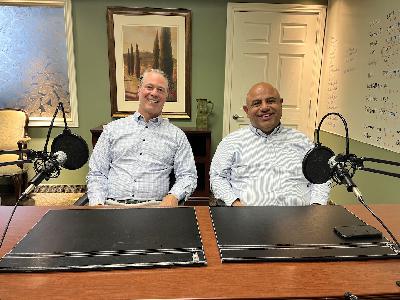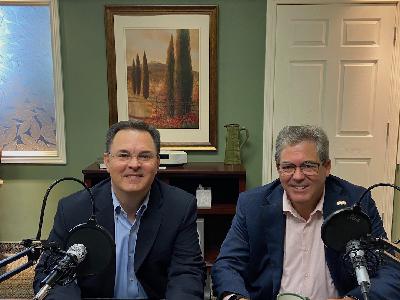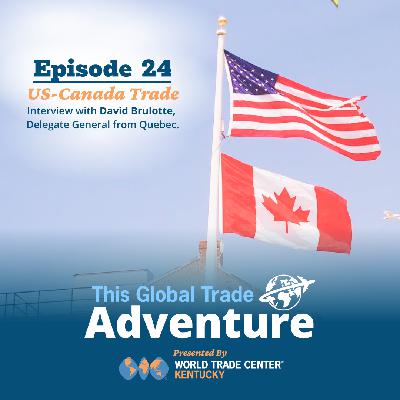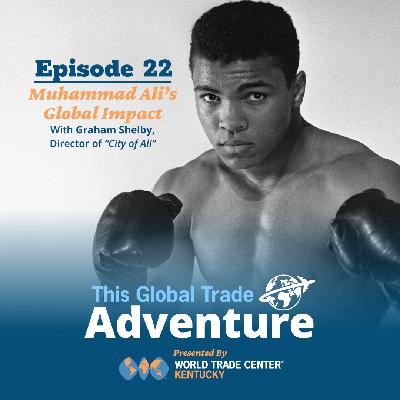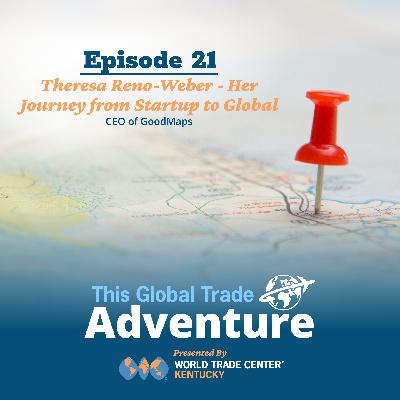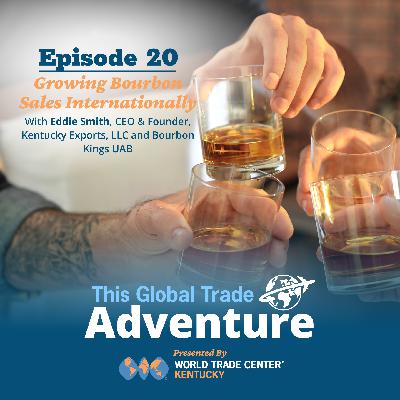Interview with Lisette Bryson, Global Manager for Trade Compliance
Description
Episode 18: Today, Omar Ayyash, President & CEO of the World Trade Center Kentucky interviews Lisette Bryson. She's the Global Manager for Trade Compliance at Alltech. They're going to discuss her experience and the importance of compliance, as it relates to global trade. It's an ever-evolving, regulatory landscape.

Meet Lisette
Lisette joined Alltech in July of 2024. However, she has an extensive background in trade compliance, working both directly for companies and in a consulting capacity. The biggest challenge companies tend to face when engaging in global business is managing the trade compliance and regulatory environment. She explains that Alltech is involved in over 140 countries, so the task is enormous.
The past several years have been extremely complex. There was Brexit in 2016. The US exited the TPP agreement in 2017. The USMCA was implemented in 2020. Additionally, the geo-political changes have continued to change in many other regions of the world.
Ensuring Your Company is Compliant
There is a wide range of regulations involving tariffs, quotas, export controls and many other issues a company must monitor and adjust to, if it's going to be successful in international trade. Lisette explains Alltech's strategy to trade compliance as having 3 components.
The first is the ability to rely on local teams. These resources are on the ground in specific countries or regions and have a better understanding about the requirements in their operating zones.
The second is the reliability of Alltech's partners. These include suppliers, logistics providers, and others who will be involved in Alltech's efforts to do commerce in specific markets.
The third strategic component is leveraging technology. Lisette is a strong proponent of using the tools that can help them to make the best decisions and to stay connected to the flow of regulations.
How Is Technology Assisting in Trade Compliance?
In a former role, Lisette was responsible for leading the IT global trade strategy. Her team was able to evaluate various software options in an effort to find the best for the company. However, she explains why she favors using bots to fulfill specific tasks.
For instance, entries needed to be reviewed before the summary report needed to be filed. This process helped to identify potential errors prior to submitting the report. The bot reviewed each scenario to ensure the specific data was present and that it was correct, when compared to related documentation. This technology helped to avoid discrepancies, time related to error remediation, as well as the cost of the time involved in correcting errors after they were submitted.
She recommends using AI for classification of material and products. AI can also be used for designation of various ECCN numbers. There is a variety of technology-based solutions to assist companies in avoiding trade compliance issues, if they are willing to implement them.
Technology Drives Cost-Savings in Compliance
Lisette describes how she and her team approach the funding requests from the C-suite. It's important to shift the paradigm focus on adding another line-item expense on the P&L, to one of value based on the cost-saving results once the technology is properly implemented.
The basic framework of the argument is that without trade compliance, selling to specific markets won't be possible. This leads to a discussion of ROI for the requested investment. Technology can reduce or eliminate time (and the cost of that time) spent on repetitive tasks. Maintaining compliance also avoids fines and penalties. This results in fewer delays in the supply chain, due to regulatory non-compliance issues.
This framework makes it easier for the C-suite to understand and evaluate the funding request. It avoids the rabbit hole involved in trying to present highly technical aspects of the software, functions and operations.
Omar comments on the importance of companies beginning and continuing to focus on digital transformation to reduce time and cost related to compliance and other areas. In his experience, he notices more of this being incorporated in emerging markets, as compared to in the US.
Industry-Specific Trade Compliance
Alltech's industry sector is highly regulated by the FDA, the USDA, the EPA and various state regulations. That's just for the US. Then, consider the regulatory agencies involved in the other 140 countries with which Alltech does business.
As successful trade compliance strategy considers the specific needs of each market your company intends to engage. Alltech uses a mitigated strategy. They look for ways to accurately classify products and determine the binding rulings that could impact those products. The objective is to stay ahead of the issues that might affect their export or sales initiatives.
Alltech participates in organizations related to their business and industry, such as the American Seed Trade Association. By working closely with these types of organizations, they can monitor compliance trends happening on a worldwide basis.
Opportunities in Emerging Markets
Alltech operates in many emerging markets. One of the upsides is that when traditional markets are slowing, the emerging market volume can help to continue providing sales and revenue. Lisette admits emerging markets can have a significant level of risk related to corruption. There are concerns associated with sharing proprietary product information. The agencies in those markets may not be as streamlined as what we are used to in the US or other developed markets.
As stated previously, Alltech relies on its local market teams. They are more in tune with what is going on, how business gets done and where both the risks/opportunities can be determined. Don't make the mistake of taking a template approach. You should develop a strategy based on those particular markets, as specifically as possible.
The Importance of Life-Long Learning
Omar asks Lisette how she stays informed about the myriad of changes that happen on a consistent basis in trade compliance, on a global scale. She takes a disciplined approach to this challenge. Each morning, before reading emails, she takes time to read the regulatory updates that are being published by the federal register, industry groups and various associations. This provides insights into how her organization may be impacted.
Additionally, she consistently communicates with her local teams as a way to supplement her morning updates.
Omar agrees that reading and working diligently to stay current is an effective strategy to either grow market share or to mitigate risk.
Mitigating Risk in Trade Compliance
Having the ability to anticipate forthcoming regulatory changes provides an opportunity to develop strategies and tactics to deal with those changes. Alltech works to identify gaps that will be created between what they are currently doing and what they'll be required to do, once those new regulations are implemented. It requires effort, but the result is can be a well-designed plan vs. a highly-reactive response.
Omar asks how Lisette works with her organization to avoid being seen as "the policeman" there to enforce changes, rather than the one who is helping the organization to continue growing while staying compliant. Part of Alltech's culture is a valuing of regulatory compliance. The company understands the importance of it and embraces it.
As a trade compliance manager, Lisette doesn't what to be the person tasked with simply saying "no."<span


